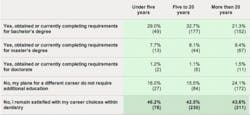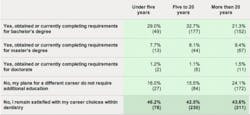Future of dental hygiene part 2
Do years of experience change dental hygienists’ perspectives about the future of dental hygiene? Hygienists with more years of experience are more likely to experience feelings associated with burnout.The “future of dental hygiene” questionnaire was posted in a recent issue of RDH eVillage; 1,521 dental hygienists participated in the survey. The survey’s results have already led to one article being published in RDH eVillage (Click here to view). (If readers have not participated in the survey, they still can by clicking here.)The RDH eVillage survey inquired if hygienists “fear” burning out from their career.• 32% of hygienists who have practiced for more than 20 years replied “burnout is already here” (compared to 13% of hygienists who have practiced for fewer than five years and 26% of hygienists who have practiced six to 20 years).• But newcomers can see how burnout can happen. 46% of hygienists who have practiced less than five years say “there’s a possibility (of burnout) later in my career.”• The last option to the “burnout” question in the survey offered the answer of “right now I’m too energized by my career to see burnout happening to me.” Only 25% of hygienists in the more than 20 years of experience category chose the optimistic option, followed by 24% of hygienists who have practiced for fewer than five years and 17% of hygienists who have practiced six to 20 years. A hygienist in the latter category of experience simply said, “I don't think there is a future. This profession is no longer respected.”However, a colleague in the six to 20 years experience category added, “I feel there are more opportunities for the dental hygiene field than in previous years due to more public education on periodontal disease and its heart disease connection.”Another survey question inquired if hygienists “could do it all over again” would they choose the same career? The majority in all experience brackets indicated that they would, led by 69% of the under five years of experience, 59% of the five to 20 years of experience, and 57% of the more than 20 years of experience. The survey also sought to determine if hygienists were pursuing educational opportunities to broaden their careers beyond clinical hygiene. Most of the extracurricular education occurs within the six to 20 years of experience.
Experience has little impact on how dental hygienists view salaries and fringe benefits. The majority does not believe compensation is adequate.* 60% of hygienists who have practiced for more than 20 years believe they should be earning income than they do, followed by 55% of hygienists who have practiced less than five years, and 54% of hygienists who have practiced six to 20 years.* The question regarding benefits asked hygienists to rate the benefits they receive in comparison to benefits received by friends or family members. 64% of hygienists who have practiced less than five years said their benefits were “below average,” followed by 60% of hygienists who practice more than 20 years and 59% of hygienists who have practiced six to 20 years.The sample comments below are separated according to years of experience:Under five years experience• "We need to be co-diagnosing and acting like owners of our chair, producing as much as possible to ensure our value to the practice — not just someone who cleans teeth — and is an essential part of seeing patients receive complete treatment."• "Future is not great. No jobs, too many schools, under-educated assistants performing coronal polishing and (in Kansas) scaling assistants that are actually doing damage to patients and the profession as a whole. Dentists pay them less; the public has no idea they are not actually getting comprehensive hygiene care. The fees that the patients are charged are the same as when they see a hygienist. It is a real mess. I think educating the public/patient/consumer is the only answer. Until patients ask, Am I being seen by a RDH?” the dentists will continue to go with the cheaper alternative. Cheaper in health care is definitely not better; I have seen it with my own eyes!"• "There are no jobs in dental hygiene — too many graduates from nonaccredited schools. When dentists are hiring, they are always looking to hire hygienists with experience. If they do hire new grads, they only want to hire grads from accredited schools and that is not fair because we all took the same board exam. Grads from nonaccredited schools proved their skills by doing a clinical exam and proved they are competent enough to work on patients in an office. I wish I knew this before and I wish i did more research before coming into hygiene. i do not see a future for hygiene, especially in a clinical setting. i am definitely going to further my education and have a career in which i can feel secure in the future, and not always worry about not having a job."Six to 20 years experience
• "If new dental hygiene schools keep emerging, the future looks poor. Dentists are very shady and will hire someone just out of school if it will save them money. I went on vacation recently, the office offered the temp half of what the going rate is, and she accepted it due to the lack of jobs."• "I am extremely worried about the future not only for dental hygiene but for dentistry as a whole (in Florida). Private practices are being purchased left and right by large "dental corporations." From their outside appearance, they look like any other private dental office; however, they are dental factories."• "Hygiene will always be needed, but for the practitioner the only reward is the salary, which has been steadily declining since the recession started. We need more ways to be valued, other than just for scaling. Even if I earned the ADHP, I couldn't use the knowledge and wouldn't get paid more, so what's the point? There is nowhere for the average hygienist to go in this profession! In nursing, you can advance to NP or become a PA. Dental (at least in Georgia) is still in the dark ages — heaven forbid if we practice without a dentist on the premises or give anesthesia."More than 20 years experience
• "Dental hygienists are overeducated for what we really do, and need the opportunity to really use their knowledge to not only create relationships with patients, but to have the authority to diagnose what is going on and be able to charge for their exams."• "As a hygienist of retirement age I may not choose this profession if I was young, as it has really changed since I began. Work opportunities were much better in the past."• "Patient education on many levels! They need to understand the level of training and education we pursued to deliver their care. The patient should know you have a license to practice. ADHA should also get the word out that patients should expect to be treated by highly trained professionals."
• "If new dental hygiene schools keep emerging, the future looks poor. Dentists are very shady and will hire someone just out of school if it will save them money. I went on vacation recently, the office offered the temp half of what the going rate is, and she accepted it due to the lack of jobs."• "I am extremely worried about the future not only for dental hygiene but for dentistry as a whole (in Florida). Private practices are being purchased left and right by large "dental corporations." From their outside appearance, they look like any other private dental office; however, they are dental factories."• "Hygiene will always be needed, but for the practitioner the only reward is the salary, which has been steadily declining since the recession started. We need more ways to be valued, other than just for scaling. Even if I earned the ADHP, I couldn't use the knowledge and wouldn't get paid more, so what's the point? There is nowhere for the average hygienist to go in this profession! In nursing, you can advance to NP or become a PA. Dental (at least in Georgia) is still in the dark ages — heaven forbid if we practice without a dentist on the premises or give anesthesia."More than 20 years experience
• "Dental hygienists are overeducated for what we really do, and need the opportunity to really use their knowledge to not only create relationships with patients, but to have the authority to diagnose what is going on and be able to charge for their exams."• "As a hygienist of retirement age I may not choose this profession if I was young, as it has really changed since I began. Work opportunities were much better in the past."• "Patient education on many levels! They need to understand the level of training and education we pursued to deliver their care. The patient should know you have a license to practice. ADHA should also get the word out that patients should expect to be treated by highly trained professionals."

